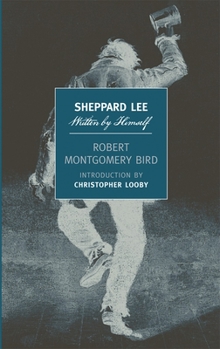Sheppard Lee: Written by Himself
Select Format
Select Condition 
Book Overview
Originally published in 1836. Sheppard Lee, Written By Himself is a work of dark satire from the early years of the American Republic. Published as an autobiography and praised by Edgar Allan Poe, this is the story of a young idler who goes in search of buried treasure and finds instead the power to transfer his soul into other men's bodies. What follows is one increasingly practiced body snatcher's picaresque journey through early American pursuits of happiness, as each new form Sheppard Lee assumes disappoints him anew while making him want more and more. When Lee's metempsychosis draws him into the marriage market, the money market, and the slave market, Bird's fable of American upward mobility takes a more sinister turn. Lee learns that everything in America, even virtue and vice, are interchangeab≤ everything is an object and has its price. Looking forward to Melville's The Confidence-Man and beyond that to William Burroughs's Naked Lunch , this strange and compelling story is a penetrating critique of American life and values as well as a crucial addition to the canon of American literature.
Format:Paperback
Language:English
ISBN:1590172299
ISBN13:9781590172292
Release Date:January 2008
Publisher:New York Review of Books
Length:472 Pages
Weight:1.08 lbs.
Dimensions:0.9" x 5.1" x 8.0"
Customer Reviews
1 rating
A delightful American masterpiece
Published by Thriftbooks.com User , 16 years ago
I spent four days reading and enjoying this wonderful novel, and spent another four days reading about it in the pages of Google Books. I found that this unsigned review captures everything I loved about the book. It appeared in the September, 1836 issue of "The Knickerbocker: Or New York Monthly Magazine." ******* OF all the native productions of the season, commend us to Sheppard Lee. We must however initiate the reader into the proper manner of perusing the work, before adverting more particularly to its qualities. The various 'books' which it contains should be read at short intervals; the volumes should be closed at the termination of each metamorphose of the author, as the curtain falls upon the different scenes of a drama; in this wise, the reader may enjoy in parcels a delicious bundle of all sorts of clever intellectual wares. The writer wins at once upon our regard, by the choice requisites of truth and freshness, and a plain unvarnished delivery of what he has to say. The separate characters which he assumes are each a picture, drawn to the life, and some of them, without doubt, from life. He gives the reins to an exuberant fancy, but is not so profusely inventive as to distract attention or curiosity. His humor is capital, and always naturally displayed, and his satire bites shrewdly, without any appearance of ill nature or malignity, which too often accompany sarcasm. [The Reviewer then quotes extensively from Sheppard Lee's life as a politician; reviews of the time often contained dozens of pages of the books being reviewed.] On throwing off his first existence, Lee becomes a rich brewer of Philadelphia: but although he has suddenly risen from poverty to affluence, he is not without his troubles. For example, [and again the book is extensively quoted; this is a small section that gives the modern reader a flavor of the whole book]: "You see, gentlemen -- (I'll take another glass of that port, Mr. Doolittle) -- you see what we must all come to! This is one of the small penalties one must pay for being a gentleman; when one dances, one must pay the piper. Now would my friend Hig- ginson there give a whole year of his best brewing, that all the pale ale and purple port that have passed his lips had been nothing better than elder-wine and bonny-clabber. But never mind, my dear sir,' said the son of AEsculapins, with a coolness that shocked me; 'as long as it's only in your foot, it's a small matter.' " 'A small matter !' -- I grinned at him ; but the unfeeling wretch only repeated his words -- 'A small matter!' " I had never been sick before in my life. As John H. Higglnson, my worst complaints had been only an occasional surfeit, or a moderate attack of booziness; and as Shep- pard Lee, I had never known any disease except laziness, which, being chronic, I had grown so accustomed to that it never troubled me. But now, ah, now! my first step into the world of enjoyment was to be made on red-hot ploughshares and pokers; my





